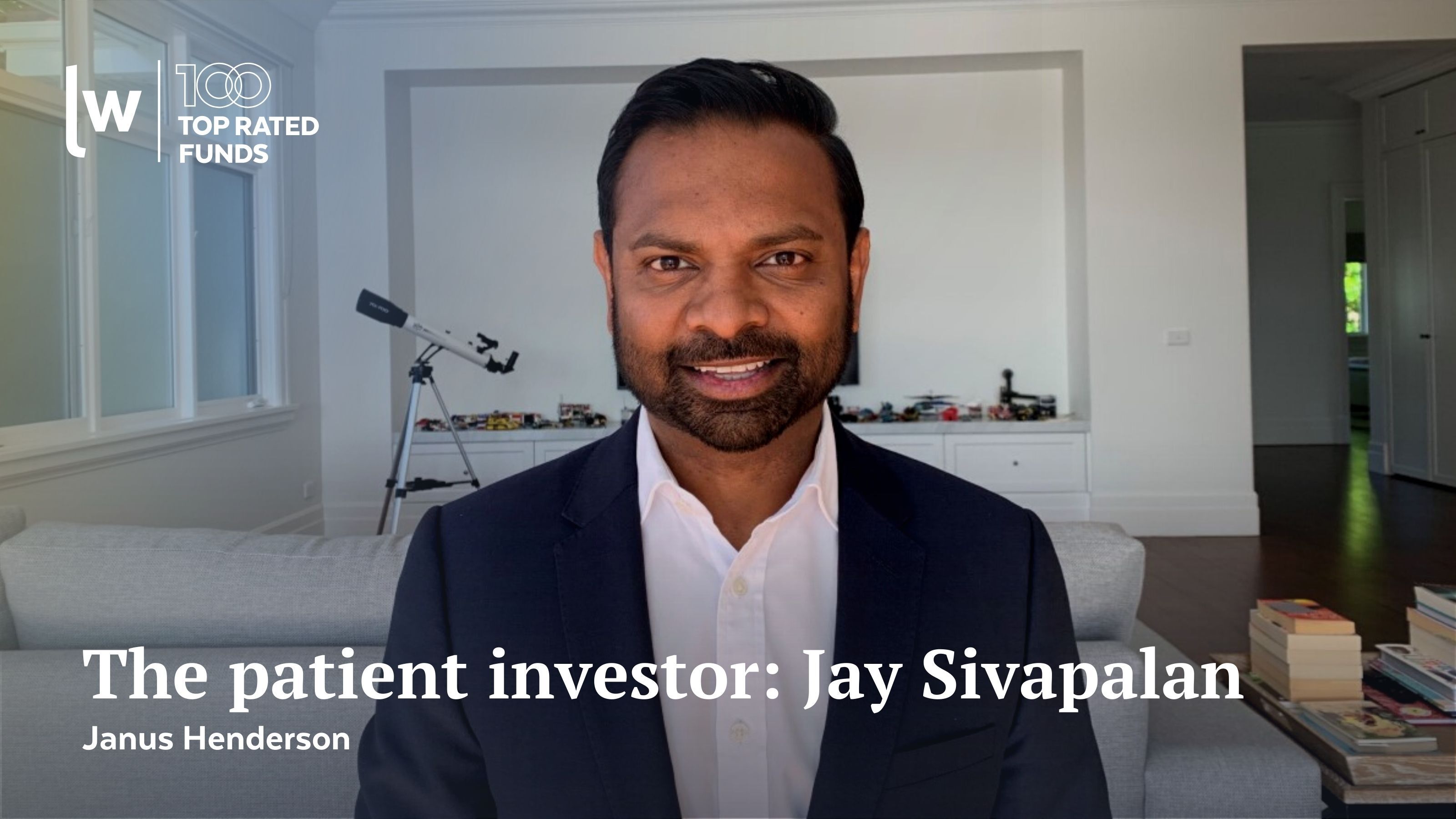The patient investor: Jay Sivapalan

Livewire Markets
Two years ago, when Livewire Markets asked Jay Sivapalan from Janus Henderson for his predictions for 2020 and beyond, his response was shocking but now appears eerily prescient.
The prediction was that the US-China trade war would continue and Australia would have to make some hard choices on who it was going to side with. Whether it was the US for security alliance or China for economic prosperity through trade. What we once hoped would be a Trumpian misstep has continued into the next US Presidency and left Australia in the middle of, and party to, the ongoing stoush.
When I recently spoke with Sivapalan, I was curious to know how he'd been considering this thesis as time went on.
"If you have a look at what's happened in the past year with the tariffs put on our wine industry, some of our commodities … They have actually been reasonably okay finding new markets to export to, like Saudi Arabia and so on. So I think Australians are starting to now think about their reliance on China and whether that's a healthy thing or not," said Sivapalan.
"They say history rhymes, but it doesn't necessarily repeat itself," he said of markets in general.
This is what really motivates him as an investor. Yes, there are patterns in markets but no two markets are exactly the same.
"I think it's that day to day, year to year and decade to decade difference that is what really makes markets interesting and challenging," he said.
.jpg)
At his core, he told us, there are three things that motivate him as an investor and fund manager.
The first, unexpectedly, is to serve people.
The second is growth, both personal and professional.
And the third, is intellectual stimulation - the exercise of the mind.
"Right across society there is a whole range of wonderful things that humans need and societies need. The most obvious one today is how we are going to collectively navigate the challenges for our planet to reverse the human impact of industrialisation. There are going to be some very smart people who are going to help with that," he said.
“Equally, I’m fortunate to be surrounded by a smart group of individuals, who are like-minded in solving the savings challenges of Australians."
Sivapalan loves the challenge of an ever-changing market.
"Just when you think you've figured it out … We're reminded very quickly by markets that 'no, you haven't figured it all out'. So there's always something new happening in markets," he said.
Sivapalan is exceptionally well-travelled by way of his late father's work. His father was an academic who lectured in the UK, Nigeria, Guyana and then Australia. Much of his early life, with the exception of the UK and Australia, was spent in developing nations where life was a lot tougher.
"Right from an early age, I knew too well how hard it was to earn money and save money. This has really driven a lot of my own investment philosophy in that when you've worked hard for it and you've earned it, you want to make sure you don't lose it. All hard-earned savings have
arisen from hard work somewhere along the line," he said.
"When I reflect back now, it's funny how life turns out. I ended up in a defensive asset class, like fixed income, and I don't think that was a coincidence," he said.

The trials and tribulations of fixed income
"The biggest theme that we're discussing at the moment and really grappling with is financial stability," said Sivapalan.
While fixed income may be a defensive asset class, it's not without its own set of threats and risks. The number one issue on Sivapalan's mind is financial stability.
His mind is cast to the rising levels of global debt, particularly government debt. Global debt levels peaked at US$290 trillion this year, according to the IIF Global Debt Monitor.
Sivalapalan is by no means an optimist. He's very mindful the vaccine roll-out has been sluggish, at best, and even post-vaccine we will still be living in a world alongside COVID-19, albeit a safer one.
"Even once we have the population vaccinated, what does global mobility look like? Can we freely travel to Europe, the US and Bali and return as we once would have?" he wonders.
He thinks this is a very different playbook to the post-GFC era which saw uninterrupted growth, but at a much slower trajectory due to the focus on fiscal austerity. This time around we've been spending relentlessly.
"We think a lot about what this means for investor outcomes ... like what you should invest in. So, you start thinking about factors like inflation, wages, company revenues, and indeed, asset price inflation as well," he said.
"We're really thinking about what could go wrong if things don't go to plan. But also, if we do get that financial stability, what are the return opportunities for investors?"
Not all threats are equal, and inflation-linked bonds are as good a hedge as any if the long-foretold inflation hits.
"I really want to emphasise inflation, while it's not certain, could really surprise markets," Sivapalan said.
Financial stability risk is something that we're all facing after COVID-19 and will continue to face for some time. So he believes it's worthwhile considering some tailored risk hedges.
"So, you know, we talk about inflation-linked bonds in our portfolios and think they’re a great hedge to the higher levels of inflation than other asset classes," he said.
While inflation hedges will be useful as a defensive asset, I also wanted to grasp Sivapalan's big ideas for the future. What predictions did he have for a truly great investment?
"When I think about the great investors in the world, they ultimately back either companies or institutions that serve a real purpose to society. So they're not companies or investments or ideas that are a quick profit idea, or only work for a period of time, or are destructive. They ultimately serve a purpose to humanity," Sivapalan said.
Finding inspiration
It's one of those dinner party questions... Of all the people in the world, who would you most like to have dinner with? Sivapalan answered, Janet Yellen, former chair of the US Federal Reserve and now Secretary of the Treasury in the US.
"At this moment in time, which country drives the global economy? It is still the US ... It's the largest, most dominant, deepest capital market in the world. And to have a policy-maker like Janet Yellen, who is at the helm of all that ... I would really want to pick her brain about what she thinks is the biggest vulnerability she's managing for," he said.
In the investment world, Sivapalan admits he's a bit of a Warren Buffett fan. He appreciates Buffett's long-term mindset and investing in businesses that serve a purpose.
"(Buffett) made many mistakes early in his career, and there were times when he invested in companies that for five years straight had gone down in price before they'd recover and go up," he said.
But despite Buffett's few investing mistakes, the King of Compound has certainly reaped the rewards of his strategy several times over.
"I think having that patience and to ask yourself the difficult questions and to back yourself is very important," Sivapalan said.
Outside of the investment world, Sivapalan credits his mother for granting him the same quality he admires in others.
"My father taught me a lot, but my mother has always inspired me. One of the things she has instilled in me is patience," he said.
"Which you need a lot of," he added.
What's the biggest myth about investing?
Despite Sivapalan's own ability to project trends, he believes the one constant is that you can't predict what happens next in markets with certainty.
"In investing you've got to have a view and you've got to back your judgement, but you've also got to be very mindful of what the alternative looks like," he said.
"If you're not right... how are you going to navigate that?"
Conclusion
It takes a certain type of leader to put people first and be motivated by serving people. Sivapalan said he feels called to serving a greater societal need, but this is perhaps the best investment advice of all. Firstly, he puts his fiduciary duty as his primary motivator, which is very telling for his asset class; he focuses on preserving capital for a living. Secondly, his desire for smart people to progress the world further and improve the way we live underpins a very sustainable investment strategy.
"It's often investors' hard-earned savings we're entrusted with," he said.

Australia's 100 top-rated funds
Livewire's Top-Rated Fund Series gives subscribers exclusive access to data and insights that will help them make more informed decisions.
Click here to view the dedicated website, which includes:
- The full list of Australia’s 100 top-rated funds.
- Detailed fund profile pages, with data powered by Morningstar.
- Exclusive interviews with expert researchers from Lonsec, Morningstar and Zenith.
- Videos and articles featuring 16 top-rated fund managers.
Not already a Livewire member?
Sign up today to get free access to investment ideas and strategies from Australia’s leading investors.
1 topic
1 fund mentioned
2 contributors mentioned

Mia Kwok is a former content editor at Livewire Markets. Mia has extensive experience in media and communications for business, financial services and policy. Mia has written for and edited several business and finance publications, such as...
Expertise

Mia Kwok is a former content editor at Livewire Markets. Mia has extensive experience in media and communications for business, financial services and policy. Mia has written for and edited several business and finance publications, such as...
